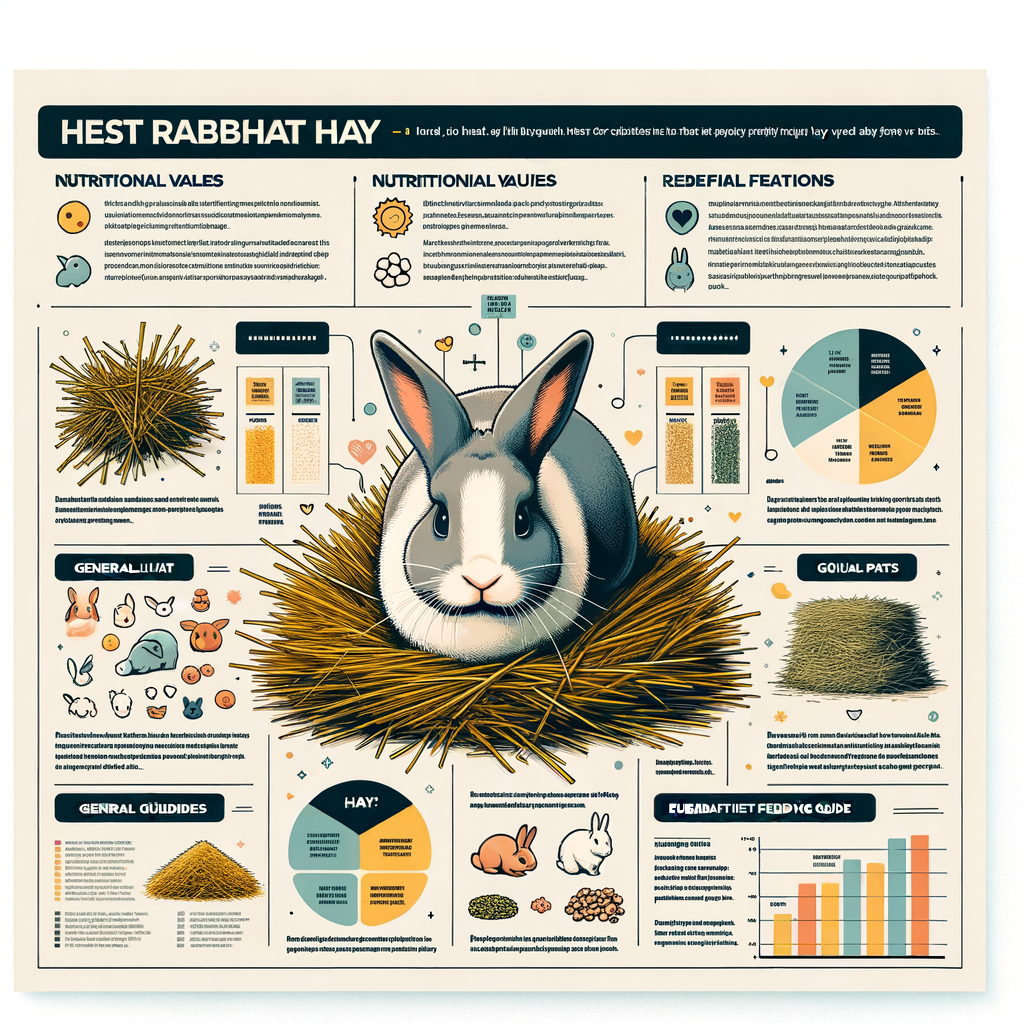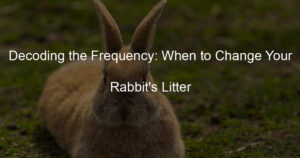
Introduction to Rabbit Hay Types
When it comes to taking care of your pet rabbit, understanding their dietary needs is crucial. One of the most important components of a rabbit’s diet is hay. In this section, we will delve into the importance of hay in a rabbit’s diet, the basics of rabbit nutrition, and introduce you to different types of rabbit hay.
- Importance of Hay in a Pet Rabbit Diet
- Understanding Rabbit Nutrition
- Introduction to Different Types of Rabbit Hay
Hay plays a pivotal role in a rabbit’s diet. It provides the necessary fiber that aids in digestion and helps maintain a healthy weight. Moreover, the act of chewing hay helps to wear down a rabbit’s teeth, which continuously grow throughout their life. Without hay, rabbits can suffer from serious dental and digestive problems.
Rabbits are herbivores, which means their diet should primarily consist of plant-based foods. A balanced rabbit diet includes hay, fresh vegetables, water, and a small amount of pellets. Hay should make up about 70% of their diet. It’s also important to note that not all hays are created equal. Different types of hay provide different nutritional benefits, so it’s essential to choose the right one for your rabbit.
There are several types of hay that you can feed your rabbit, each with its own unique nutritional profile. Some of the most common types include Timothy hay, Meadow hay, and Alfalfa hay. Timothy hay is a great all-around choice, as it provides a good balance of fiber, protein, and fat. Meadow hay is rich in fiber but lower in protein, making it a good choice for older rabbits. Alfalfa hay is high in protein and calcium, making it suitable for younger rabbits, but it should be fed in moderation to adult rabbits due to its high calorie content.
In the following sections, we will delve deeper into how to choose the best hay for your rabbit, what to look for in high-quality rabbit hay, and provide a comparison of different types of rabbit hay. We will also share some case studies on rabbit hay selection, provide a comprehensive rabbit feeding guide, and conclude with tips on ensuring a balanced pet rabbit diet.
Choosing the Best Hay for Rabbits
When it comes to feeding your pet rabbit, choosing the right type of hay is crucial. Hay not only provides the necessary fiber for your rabbit’s diet, but it also helps to grind down their ever-growing teeth, promoting dental health. However, not all hay is created equal. The best hay for your rabbit will depend on several factors.
Factors to Consider in Choosing Rabbit Hay
Before you head to the pet store or start browsing online, consider these key factors that can influence the type of hay you should choose for your rabbit:
- Age of the Rabbit
- Rabbit’s Health Condition
- Availability of the Hay Type
Rabbits of different ages have different nutritional needs. Young rabbits (under 7 months) can benefit from alfalfa hay, which is rich in protein and calcium. However, for adult rabbits, alfalfa can lead to weight gain and urinary issues. Instead, opt for grass hays like Timothy, orchard, or meadow hay.
If your rabbit has a specific health condition, it may require a particular type of hay. For instance, rabbits with dental issues may need a coarser hay to help wear down their teeth. If your rabbit is overweight, a lower calorie hay like orchard grass may be a better choice.
While Timothy hay is often recommended for adult rabbits, it may not be readily available in all areas. In such cases, other types of grass hay can be a good alternative. Always ensure that the hay you choose is fresh and free from mold and dust.
Remember, the best hay for your rabbit is the one that they will eat consistently. It’s always a good idea to offer a variety of hays to keep your rabbit interested and ensure they’re getting a range of nutrients. Always consult with your vet if you have any concerns about your rabbit’s diet.
High-Quality Rabbit Hay: What to Look For
When it comes to feeding your pet rabbit, the quality of the hay you choose can significantly impact their health and happiness. Here are some key factors to consider when selecting high-quality rabbit hay:
- Color and Smell of the Hay
- Texture of the Hay
- Hay Packaging and Storage
The color and smell of the hay are two of the most important indicators of its quality. Fresh hay should have a vibrant green color and a sweet, grassy smell. If the hay is yellow, brown, or has a musty or moldy smell, it’s likely old or improperly stored and could potentially harm your rabbit.
The texture of the hay is another crucial factor to consider. High-quality hay should feel coarse to the touch, which helps to wear down your rabbit’s teeth and aid digestion. If the hay feels soft or powdery, it may not provide the necessary roughage your rabbit needs.
The way the hay is packaged and stored can also affect its quality. Hay should be stored in a cool, dry place to prevent mold growth. It’s best to buy hay in a sealed bag that protects it from moisture and pests. Also, remember to check the packaging for a “best by” date to ensure you’re getting the freshest hay possible.
By paying attention to these factors, you can ensure you’re providing your pet rabbit with the highest quality hay. Remember, a healthy diet contributes significantly to your rabbit’s overall well-being.
Different Types of Rabbit Hay
When it comes to feeding your pet rabbit, hay is a crucial part of their diet. There are different types of hay that you can offer to your rabbit. One of the most popular and beneficial types is Timothy hay.
Timothy Hay
Timothy hay is a favorite among many rabbit owners due to its numerous health benefits and its availability. Let’s delve into the benefits of Timothy hay and when it’s best to feed it to your rabbit.
- Benefits of Timothy Hay
- When to Feed Timothy Hay
Timothy hay is packed with fiber which is essential for your rabbit’s digestive health. It helps in preventing obesity, dental disease, and hairballs. Moreover, it’s low in protein and calcium, making it an excellent choice for adult rabbits. The long fiber strands in Timothy hay also promote natural chewing activity, which helps keep your rabbit’s teeth worn down and healthy.
Timothy hay should be available to your rabbit at all times. It’s their main source of food and they need it to keep their digestive systems working properly. Remember to always provide fresh hay, and remove any old or soiled hay from their cage daily. Feeding your rabbit Timothy hay in the morning and evening can also help establish a feeding routine.
Understanding the different types of hay and their benefits can help you provide the best diet for your pet rabbit. Remember, a healthy rabbit is a happy rabbit!
Alfalfa Hay
Alfalfa hay is another type of hay that is beneficial for rabbits. It is a legume hay, which means it is higher in protein, calories, and calcium compared to grass hays. This makes it an excellent choice for specific groups of rabbits.
- Benefits of Alfalfa Hay
- When to Feed Alfalfa Hay
Alfalfa hay is rich in nutrients that are essential for the growth and development of young rabbits. It contains high amounts of protein, which is crucial for muscle development. It also has a high calcium content, which is necessary for bone growth and strength. Furthermore, the high caloric content of alfalfa hay makes it an excellent source of energy for active and growing rabbits.
Alfalfa hay is most suitable for young rabbits, under the age of one year, and pregnant or nursing does. This is because these groups of rabbits have higher nutritional needs. However, alfalfa hay should not be the main diet for adult rabbits due to its high protein and calcium content. Feeding alfalfa hay to adult rabbits can lead to obesity and urinary problems. Therefore, it is best to feed alfalfa hay to adult rabbits as a treat, in small quantities.
In conclusion, alfalfa hay can be a beneficial part of a rabbit’s diet when fed appropriately. It is essential to understand the nutritional needs of your rabbit and adjust their diet accordingly to ensure they remain healthy and happy.
Oat Hay
One of the various types of hay that can be beneficial for your rabbit’s diet is Oat hay. This type of hay is not only tasty for your furry friend but also packed with essential nutrients.
- Benefits of Oat Hay
- When to Feed Oat Hay
Oat hay is a great source of fiber, which is crucial for a rabbit’s digestive health. It also contains a good balance of proteins and carbohydrates. Not only does it contribute to a balanced diet, but it also provides mental stimulation for rabbits as they enjoy the process of eating it. Furthermore, the roughage in oat hay helps in wearing down a rabbit’s constantly growing teeth, promoting dental health.
Oat hay can be fed to rabbits of all ages. However, it’s particularly beneficial for older rabbits who may struggle with harder hays like Timothy hay. It’s also a good option for rabbits who are fussy eaters as it has a sweeter taste. You can feed your rabbit oat hay daily, but remember to mix it with other types of hay to ensure a balanced diet. Always ensure fresh water is available for your rabbit when feeding them hay.
In conclusion, oat hay is a nutritious and enjoyable addition to your rabbit’s diet. It provides a range of benefits from aiding digestion to promoting dental health. However, it’s important to remember that no single type of hay should make up the entirety of your rabbit’s diet. Variety is key to ensuring your rabbit gets all the nutrients they need.
Rabbit Hay Comparison
When it comes to choosing the best hay for your rabbit, there are several factors to consider. We will compare different types of rabbit hay based on their nutritional value, cost, and availability.
-
Comparing Nutritional Value
Not all hays are created equal when it comes to nutritional value. Timothy hay, for example, is a great source of fiber and is recommended by many veterinarians. On the other hand, alfalfa hay is rich in calcium and protein, making it a good choice for young, growing rabbits but not ideal for adults due to its high calorie content.
-
Comparing Cost
The cost of hay can vary greatly depending on the type and where you purchase it. Generally, Timothy hay tends to be more expensive than other types due to its high nutritional value and popularity among rabbit owners. Alfalfa hay, while cheaper, may not be the most cost-effective choice in the long run if it leads to health issues due to overfeeding.
-
Comparing Availability
Availability is another important factor to consider. While most pet stores carry a variety of hay types, some may not be readily available in all areas. For instance, Timothy hay is widely available, but other types like orchard grass hay or oat hay might be harder to find. It’s always a good idea to check with your local pet stores or online retailers to see what’s available in your area.
In conclusion, when comparing different types of rabbit hay, it’s important to consider not only the cost but also the nutritional value and availability. By doing so, you can ensure that you’re providing your pet with the best possible diet.
Rabbit Hay Selection: Case Studies
Choosing the right hay for your rabbit at different stages of their life is crucial for their health and well-being. Let’s take a look at three case studies that highlight the importance of selecting the appropriate hay for young, adult, and senior rabbits.
- Case study 1: Choosing hay for a young rabbit
- Case study 2: Choosing hay for an adult rabbit
- Case study 3: Choosing hay for a senior rabbit
Meet Daisy, a young rabbit who is just starting to explore her diet. Her owner decided to introduce alfalfa hay into her diet, which is rich in protein and calcium. These nutrients are essential for Daisy’s growth and development. After a few weeks, Daisy’s owner noticed that she has become more active and her fur is shinier. This case study shows that alfalfa hay is an excellent choice for young rabbits.
Next, we have Max, an adult rabbit. Max’s owner switched his diet from alfalfa hay to timothy hay. Timothy hay is lower in protein and calcium, which is more suitable for adult rabbits like Max. After the switch, Max’s owner noticed that Max has maintained a healthy weight and his digestion has improved. This case study highlights that timothy hay is ideal for adult rabbits.
Lastly, we have Bella, a senior rabbit. Bella’s owner decided to introduce a mix of timothy hay and oat hay into her diet. Oat hay is rich in fiber, which is beneficial for Bella’s digestion. After a few weeks, Bella’s owner noticed that Bella’s digestion has improved and she is more active. This case study demonstrates that a mix of timothy hay and oat hay can be beneficial for senior rabbits.
In conclusion, the type of hay you choose for your rabbit can significantly impact their health and well-being. It’s important to select the appropriate hay based on your rabbit’s age and nutritional needs.
Rabbit Feeding Guide
Feeding your rabbit the right amount and type of hay is crucial for their health and happiness. This guide will help you understand how much hay to feed, when to feed it, and how to store and preserve it properly.
- How much hay to feed
- When to feed hay
- How to store and preserve hay
Rabbits should have access to fresh hay at all times. The amount of hay they consume can vary depending on their size and age. However, a good rule of thumb is that a rabbit should eat a pile of hay that’s about the same size as their body every day. This ensures they get the necessary fiber and nutrients for a healthy digestive system.
Hay should be available to your rabbit 24/7. They have a unique digestive system that requires them to eat frequently throughout the day and night. Providing them with constant access to hay helps keep their gut moving and prevents digestive issues.
Proper storage of hay is essential to maintain its nutritional value and prevent mold growth. Hay should be stored in a cool, dry place away from direct sunlight. It’s best to keep it in a breathable container like a hay bag or a wooden box with air holes. This allows air circulation and prevents moisture buildup. Remember to check the hay regularly for any signs of mold or dampness, and discard any that appears spoiled.
Feeding your rabbit correctly is a significant part of ensuring they live a long, healthy life. Remember, the quality of the hay is just as important as the quantity. Always choose high-quality hay and store it properly to maintain its nutritional value.
Conclusion: Ensuring a Balanced Pet Rabbit Diet
As we wrap up our discussion on rabbit hay types and selection, let’s focus on the broader picture – ensuring a balanced diet for your pet rabbit. A balanced diet is crucial for your rabbit’s overall health and well-being. Let’s delve into the key aspects of a balanced rabbit diet.
- Importance of variety in a rabbit’s diet
- Other foods to supplement with hay
- Monitoring your rabbit’s health and diet
Just like humans, rabbits also need a varied diet for optimal health. A diet that only consists of one type of food, even if it’s high-quality hay, can lead to nutritional deficiencies. Variety ensures that your rabbit gets a mix of different nutrients. For instance, while hay provides fiber, other foods can provide proteins, vitamins, and minerals. Hence, a variety of foods is essential.
While hay should make up the majority of your rabbit’s diet, it’s important to supplement it with other foods. Fresh vegetables like broccoli, spinach, and carrots can provide essential vitamins and minerals. Fruits can be given as occasional treats. Pellets, in moderation, can also be a part of your rabbit’s diet. However, remember to introduce new foods gradually to avoid digestive issues.
Regular monitoring of your rabbit’s health and diet is crucial. Pay attention to their eating habits. If your rabbit is eating less than usual or showing signs of discomfort after eating, it might be a sign of a health issue. Regular vet check-ups are also important to ensure your rabbit is not only eating right but also digesting the food properly and staying healthy.
To sum up, a balanced diet for your pet rabbit should be diverse, including hay, fresh vegetables, fruits, and pellets in moderation. Regular monitoring of your rabbit’s diet and health can help detect any potential issues early. Remember, a healthy diet equals a happy rabbit!




